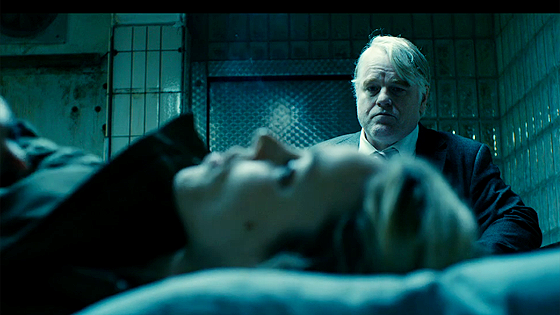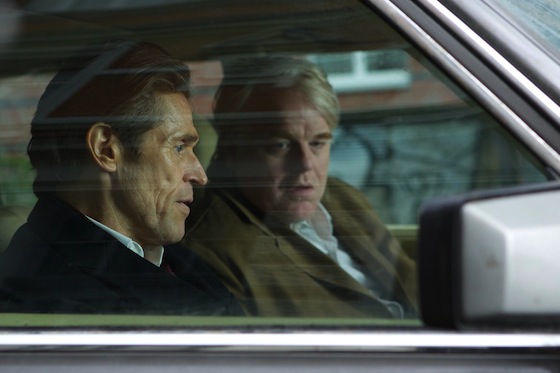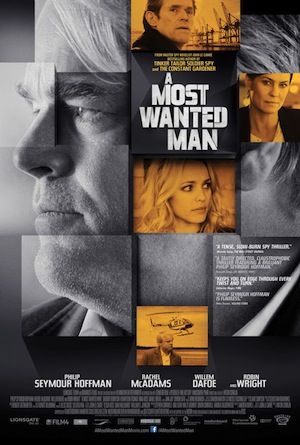This review appears at Lawrence.com.
Shades of sadness and defeat simmer just below the surface of Philip Seymour Hoffman’s subtle performance in A Most Wanted Man. Knowing the late actor’s personal troubles while he was filming the spy thriller, it’s hard not to wonder how much of that informed his character.
Either way, it’s Hoffman who anchors this John le Carré adaptation and makes it compelling, even when the film’s rambling tendencies threaten to derail it.
Hoffman plays a rumpled German intelligence agent named Günther Bachmann. He’s tracking the whereabouts of a Chechen refugee who recently entered Hamburg and also looking at the money trail surrounding a prominent Muslim professor for possible terrorist connections.
British and American agents circle the investigation, and possible interference from them looms big in the background, especially since American involvement caused Günther’s last big operation to fail. He lost friends in the process, and was left questioning the larger context of his job.
 The movie, and more so the 2008 novel, is a critique of aggressive post-9/11 intelligence policies that trample human rights, but it hinges on Hoffman’s ability to play this struggle out internally. Smart and confident in his own intuition, Günther proceeds the way he sees fit—which isn’t always encouraged by the higher-ups. His experience and insight doesn’t allow him to see the people he’s spying on as one-dimensional bad guys, and it’s this gray area that isn’t considered enough by the power players in his community.
The movie, and more so the 2008 novel, is a critique of aggressive post-9/11 intelligence policies that trample human rights, but it hinges on Hoffman’s ability to play this struggle out internally. Smart and confident in his own intuition, Günther proceeds the way he sees fit—which isn’t always encouraged by the higher-ups. His experience and insight doesn’t allow him to see the people he’s spying on as one-dimensional bad guys, and it’s this gray area that isn’t considered enough by the power players in his community.
“A Most Wanted Man” is stylishly put together by director Anton Corbijn, whose color palette is somber and focused. The script, adapted by Andrew Bovell, doesn’t pump up a lot of sequences for big action thrills, but rather revels in throwing examining the clouded motivations and conflicts of its many supporting characters, including characters played by Willem Dafoe, Rachel McAdams, and Robin Wright, all turning in solid performances as well.
 In other words, A Most Wanted Man is a slow burn and it meanders a bit. The movie is not as impenetrable, however, as the 2011 le Carré adaptation Tinker Tailor Soldier Spy, which starred Gary Oldman as a similarly vexed British agent. The key to understanding the subtleties of the plot are all in Hoffman’s performance: If the exposition gets too dense, the plot’s signposts are written all over his expressive face and body.
In other words, A Most Wanted Man is a slow burn and it meanders a bit. The movie is not as impenetrable, however, as the 2011 le Carré adaptation Tinker Tailor Soldier Spy, which starred Gary Oldman as a similarly vexed British agent. The key to understanding the subtleties of the plot are all in Hoffman’s performance: If the exposition gets too dense, the plot’s signposts are written all over his expressive face and body.
The weight of Günther’s responsibility to his country and his agents are in every frame of A Most Wanted Man, and a sense of loss pervades the entire movie. Hoffman’s character wrestles with the expendable nature of human life and the costs of his job in this modern age, but the tragedy of the actor’s untimely death also looms large.
His last lead performance is filled with exasperation at a world that refuses to see things the way he does, and Hoffman gives profound voice to this commonality amongst us all.









Comments on this entry are closed.